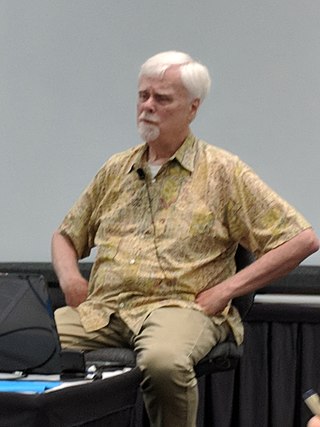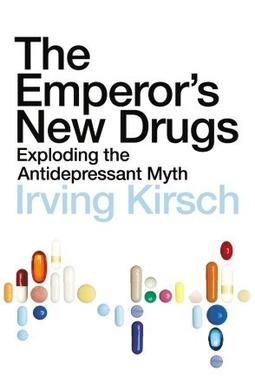Related Research Articles

Antidepressants are a class of medications used to treat major depressive disorder, anxiety disorders, chronic pain, and addiction.

Major depressive disorder (MDD), also known as clinical depression, is a mental disorder characterized by at least two weeks of pervasive low mood, low self-esteem, and loss of interest or pleasure in normally enjoyable activities. Introduced by a group of US clinicians in the mid-1970s, the term was adopted by the American Psychiatric Association for this symptom cluster under mood disorders in the 1980 version of the Diagnostic and Statistical Manual of Mental Disorders (DSM-III), and has become widely used since.

Tricyclic antidepressants (TCAs) are a class of medications that are used primarily as antidepressants. TCAs were discovered in the early 1950s and were marketed later in the decade. They are named after their chemical structure, which contains three rings of atoms. Tetracyclic antidepressants (TeCAs), which contain four rings of atoms, are a closely related group of antidepressant compounds.

Bupropion, sold under the brand name Wellbutrin among others, is an atypical antidepressant primarily used to treat major depressive disorder and to support smoking cessation. It is also popular as an add-on medication in the cases of "incomplete response" to the first-line selective serotonin reuptake inhibitor (SSRI) antidepressant. Bupropion has several features that distinguish it from other antidepressants: it does not usually cause sexual dysfunction, it is not associated with weight gain and sleepiness, and it is more effective than SSRIs at improving symptoms of hypersomnia and fatigue. Bupropion, particularly the immediate release formulation, carries a higher risk of seizure than many other antidepressants, hence caution is recommended in patients with a history of seizure disorder.

Venlafaxine, sold under the brand name Effexor among others, is an antidepressant medication of the serotonin-norepinephrine reuptake inhibitor (SNRI) class. It is used to treat major depressive disorder, generalized anxiety disorder, panic disorder, and social anxiety disorder. Studies have shown that Venlafaxine improves quality of life. It may also be used for chronic pain. It is taken by mouth. It is also available as the salt venlafaxine besylate in an extended-release formulation.
Biological psychiatry or biopsychiatry is an approach to psychiatry that aims to understand mental disorder in terms of the biological function of the nervous system. It is interdisciplinary in its approach and draws on sciences such as neuroscience, psychopharmacology, biochemistry, genetics, epigenetics and physiology to investigate the biological bases of behavior and psychopathology. Biopsychiatry is the branch of medicine which deals with the study of the biological function of the nervous system in mental disorders.
Richard Alan Friedman is professor of Clinical Psychiatry at Weill Cornell Medical College, attending psychiatrist at NewYork–Presbyterian Hospital and director of Psychopharmacology at the Payne Whitney Psychiatric Clinic. He is an expert in the pharmacologic treatment of personality, mood and anxiety disorders, obsessive–compulsive disorder, PTSD and refractory depression.

Tianeptine, sold under the brand names Stablon, Tatinol, and Coaxil among others, is an atypical tricyclic antidepressant which is used mainly in the treatment of major depressive disorder, although it may also be used to treat anxiety, asthma, and irritable bowel syndrome.

Randolph Martin Nesse is an American physician, scientist and author who is notable for his role as a founder of the field of evolutionary medicine and evolutionary psychiatry.
Mental disorders are classified as a psychological condition marked primarily by sufficient disorganization of personality, mind, and emotions to seriously impair the normal psychological and often social functioning of the individual. Individuals diagnosed with certain mental disorders can be unable to function normally in society. Mental disorders may consist of several affective, behavioral, cognitive and perceptual components. The acknowledgement and understanding of mental health conditions has changed over time and across cultures. There are still variations in the definition, classification, and treatment of mental disorders.

David D. Burns is an American psychiatrist and adjunct professor emeritus in the Department of Psychiatry and Behavioral Sciences at the Stanford University School of Medicine. He is the author of bestselling books such as Feeling Good: The New Mood Therapy, The Feeling Good Handbook and Feeling Great: The Revolutionary New Treatment for Depression and Anxiety.

Esketamine, also known as (S)-ketamine or S(+)-ketamine, is the S(+) enantiomer of ketamine. It is a dissociative hallucinogen drug used as a general anesthetic and as an antidepressant for treatment of depression. It is sold under the brand names Spravato, Ketanest, among others. Esketamine is the active enantiomer of ketamine in terms of NMDA receptor antagonism and is more potent than racemic ketamine.
Frederick King Goodwin was an American psychiatrist and Clinical Professor of Psychiatry at the George Washington University Medical Center, where he was also director of the Center on Neuroscience, Medical Progress, and Society. He was a specialist in bipolar disorder and recurrent depression.

Irving Kirsch is an American psychologist and academic. He is the Associate Director of the Program in Placebo Studies and a lecturer in medicine at the Harvard Medical School and Beth Israel Deaconess Medical Center. He is also professor emeritus of psychology at the Universities of Hull and Plymouth in the United Kingdom, and the University of Connecticut in the United States. Kirsch is a leading researcher within the field of placebo studies who is noted for his work on placebo effects, antidepressants, expectancy, and hypnosis. He is the originator of response expectancy theory, and his analyses of clinical trials of antidepressants have influenced official treatment guidelines in the United Kingdom. He is the author of the 2009 book The Emperor's New Drugs, which argued most antidepressant medication is effective primarily due to placebo effects.

Selective serotonin reuptake inhibitors (SSRIs) are a class of drugs that are typically used as antidepressants in the treatment of major depressive disorder, anxiety disorders, and other psychological conditions.

The Emperor's New Drugs – Exploding the Antidepressant Myth is a 2009 book by Irving Kirsch, arguing that the chemical imbalance theory of depression is wrong and that antidepressants have little or no direct effect on depression but, because of their common or serious side-effects, they are powerful active placebos.
The relationship between antidepressant use and suicide risk is a subject of medical research and has faced varying levels of debate. This problem was thought to be serious enough to warrant intervention by the U.S. Food and Drug Administration to label greater likelihood of suicide as a risk of using antidepressants. Some studies have shown that the use of certain antidepressants correlate with an increased risk of suicide in some patients relative to other antidepressants. However, these conclusions have faced considerable scrutiny and disagreement: A multinational European study indicated that antidepressants decrease risk of suicide at the population level, and other reviews of antidepressant use claim that there is not enough data to indicate antidepressant use increases risk of suicide.
The pharmacology of antidepressants is not entirely clear. The earliest and probably most widely accepted scientific theory of antidepressant action is the monoamine hypothesis, which states that depression is due to an imbalance of the monoamine neurotransmitters. It was originally proposed based on the observation that certain hydrazine anti-tuberculosis agents produce antidepressant effects, which was later linked to their inhibitory effects on monoamine oxidase, the enzyme that catalyses the breakdown of the monoamine neurotransmitters. All currently marketed antidepressants have the monoamine hypothesis as their theoretical basis, with the possible exception of agomelatine which acts on a dual melatonergic-serotonergic pathway. Despite the success of the monoamine hypothesis it has a number of limitations: for one, all monoaminergic antidepressants have a delayed onset of action of at least a week; and secondly, there are a sizeable portion (>40%) of depressed patients that do not adequately respond to monoaminergic antidepressants. Further evidence to the contrary of the monoamine hypothesis are the recent findings that a single intravenous infusion with ketamine, an antagonist of the NMDA receptor — a type of glutamate receptor — produces rapid, robust and sustained antidepressant effects. Monoamine precursor depletion also fails to alter mood. To overcome these flaws with the monoamine hypothesis a number of alternative hypotheses have been proposed, including the glutamate, neurogenic, epigenetic, cortisol hypersecretion and inflammatory hypotheses. Another hypothesis that has been proposed which would explain the delay is the hypothesis that monoamines don't directly influence mood, but influence emotional perception biases.

Study 329 was a clinical trial which was conducted in North America from 1994 to 1998 to study the efficacy of paroxetine, an SSRI anti-depressant, in treating 12- to 18-year-olds diagnosed with major depressive disorder. Led by Martin Keller, then professor of psychiatry at Brown University, and funded by the British pharmaceutical company SmithKline Beecham—known since 2000 as GlaxoSmithKline (GSK)—the study compared paroxetine with imipramine, a tricyclic antidepressant, and placebo. SmithKline Beecham had released paroxetine in 1991, marketing it as Paxil in North America and Seroxat in the UK. The drug attracted sales of $11.7 billion in the United States alone from 1997 to 2006, including $2.12 billion in 2002, the year before it lost its patent.

Jan A. Fawcett was an American psychiatrist, educator, and author. His research career focused on the mechanism of action of antidepressant medications and the development of more effective medications for severe depression and treatment modifiable factors leading up to suicide. Fawcett died on May 9, 2022, after a long health struggle.
References
- ↑ Kaplan, Arline (December 1, 2005). "Through the Times With Peter Kramer, M.D." Psychiatric Times . 23 (14).
All my relatives were German Jews. Those few who had managed to get out--they included my parents, my grandparents and one great-grandmother--had done so at the last possible moment. Most other family members were killed or died of medical neglect.
- ↑ "Peter D. Kramer Clinical Professor Emeritus of Psychiatry and Human Behavior". Brown University. Retrieved February 23, 2017.